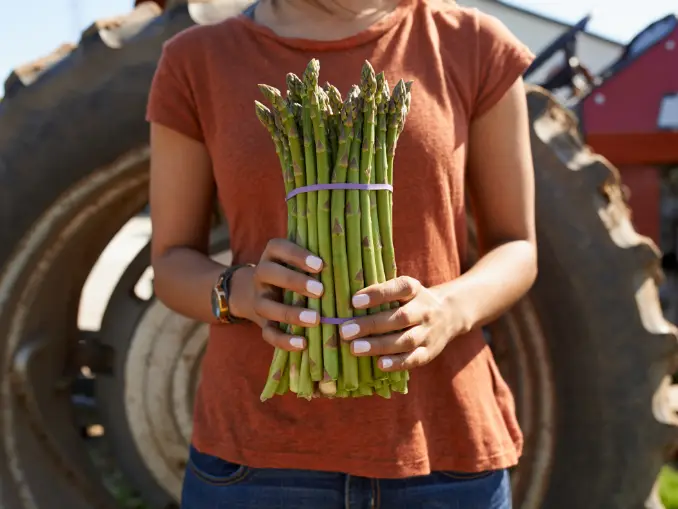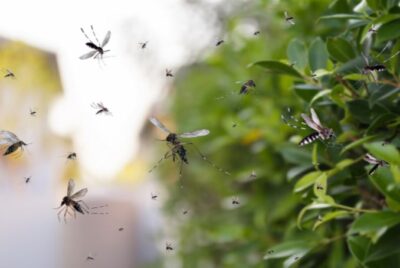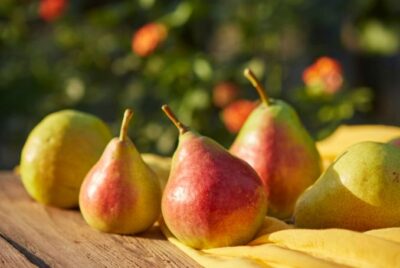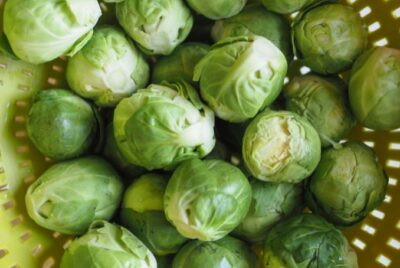Feeding Flock Favorites: Can Chickens Eat Asparagus Safely?
Are you struggling to find the perfect balance between providing nutritious treats and avoiding potential health risks for your beloved flock? The dilemma of whether chickens can eat asparagus might be causing you undue stress. Delving into the complexities of poultry nutrition can be daunting, especially when it comes to introducing unfamiliar foods like asparagus.
So in this guide, we address this pressing concern head-on, offering clarity and guidance to ensure the well-being of your feathered companions.
Table of Contents
Asparagus and Chickens: A Nutritious Combination?
Chickens pecking around the yard are a common sight for many backyard farmers, and these birds often enjoy a diverse diet.
But when it comes to treats, can chickens eat asparagus? The answer is a resounding yes! Asparagus is not just a delicious vegetable for humans; it’s also a nutritious treat for chickens. Packed with essential vitamins and minerals, this veggie can contribute to the overall development and health of your flock. In fact, chickens eat peas as well, making their diet even more diverse and nutritious.
The image of chickens munching on green asparagus might amuse you, but it’s wise to approach this with some knowledge.
This vegetable can be beneficial but understanding its nutritional benefits and potential risks is key before offering it to your chickens. This will ensure that your chickens can enjoy asparagus safely and reap all the health benefits it has to offer.
Nutrient Profile of Asparagus
This yummy vegetable is teeming with vitamins A, C, E, and K, along with folate and phosphorus, providing a host of beneficial nutrients that support your chickens’ immune systems and contribute to their vitality.
Moreover, asparagus is rich in hydration, thanks to its high water content, which is particularly important during those hot summer days. The dietary fiber found in asparagus also aids in healthy digestion, making it a healthy snack for your clucking companions.
In addition to vitamins and hydration, asparagus is also a rich source of high-quality proteins and essential amino acids. Amino acids like lysine and tryptophan play a crucial role in reducing oxidative stress and keeping your chickens healthy. Half a cup of asparagus can deliver a good dose of protein and essential nutrients without the risk of obesity or heart disease, making it a great addition to your chicken feed.
Plus, with 24 mg of calcium and 52 mg of phosphorus per serving, asparagus supports robust egg production, so you can expect to collect some high-quality eggs from your laying hens.
Safety Concerns and Toxicity
Like any other treat, caution is necessary when feeding asparagus to chickens. Here are some tips to ensure their safety:
- Avoid feeding whole asparagus, as it can present a choking hazard.
- Do not feed the asparagus ferns, as they can cause irritation and digestive issues for your chickens.
- Stick to feeding the asparagus spears and leave the ferns out of the chicken coop.
- Prepare the asparagus in a way that’s easy for the chickens to eat and digest.
Remember, the key to safely adding asparagus to your chickens’ diet is to ensure it’s prepared in a way that’s easy for them to eat and digest.
So, while asparagus offers many of the same benefits to chickens as it does to humans, there are certain precautions you need to take.
By being mindful of how you prepare and serve asparagus, you can prevent potential health issues and make this nutritious treat a safe and enjoyable addition to your chickens’ diet.
Read also: Can Chickens Eat Celery? It’s Leaves, Stalks and More
How to Properly Feed Asparagus to Your Chickens
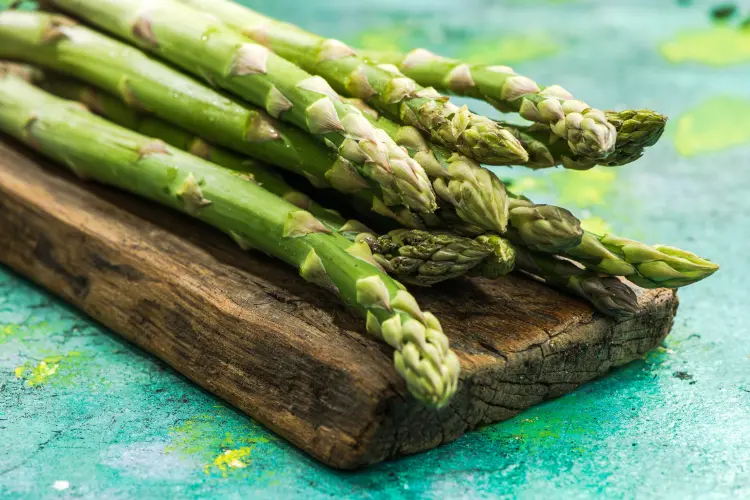
When introducing asparagus or other new treats to your backyard chickens, it’s important to do it in a manner that ensures their safety and interest. You might be wondering, can chickens eat raw asparagus, or is it better to serve it cooked? The truth is, chickens can eat both raw and cooked asparagus, but there are some things to consider to ensure they’re getting the most out of this healthy snack.
Firstly, seasoning is a no-go. Chickens should not eat seasoned asparagus, as additives like salt and spices can lead to digestive issues. Instead, opt for plain, unseasoned asparagus, whether you choose to serve it raw or cooked.
And when it comes to preparation, remember to chop the asparagus into small, manageable pieces. This makes it easier for your chickens to eat and helps prevent choking hazards.
If you’re serving asparagus fresh from the garden, ensure it’s clean and free from pesticides or chemicals. Asparagus can be a delightful snack for your chickens when prepared properly, and keeping it fresh and simple is the way to go.
Raw vs. Cooked Asparagus
Now, let’s consider the question of raw versus cooked asparagus. While chickens can enjoy asparagus in both forms, the texture and ease of digestion are factors to consider. Raw asparagus is a bit tougher, which means your chickens might not be as eager to peck at it.
On the flip side, cooked asparagus becomes softer and easier for chickens to digest, making it a preferable option for many chicken owners.
If you do decide to feed your chickens raw asparagus, make sure to chop it into bite-sized pieces to facilitate digestion and prevent any digestive issues.
When cooking, remember that the asparagus should be free of any seasoning that could be harmful. Steaming or roasting can be good methods to prepare asparagus for your feathered friends, ensuring it’s tender enough for them to enjoy.
Chopping and Serving Techniques
Cutting asparagus into bite-sized pieces is not only convenient but also ensures safety. The tough and woody stems of asparagus can be difficult for chickens to digest and may even pose a choking risk.
To avoid any issues, it’s best to remove these parts before serving. Once you’ve got the tender parts of the asparagus, cutting them into small pieces will make them more palatable and digestible for your chickens.
If you’re serving cooked asparagus, steaming the stalks until they reach a tender texture is ideal. You can even mash the steamed asparagus before offering it to the chickens to ensure it’s soft and easy for them to eat.
Another method is to mix the chopped asparagus with their regular feed, integrating this nutritious treat into their diet seamlessly.
The Importance of Moderation in Feeding Asparagus
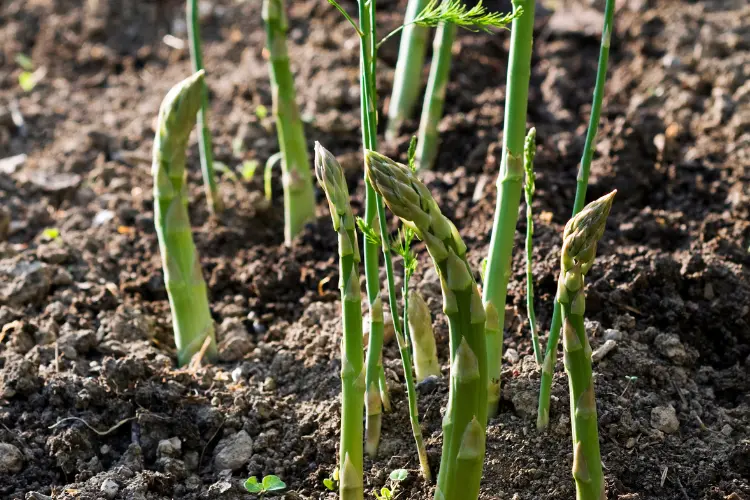
Asparagus can be a great addition to your chickens’ diet, but as with all good things, it should be offered in moderation. You might be curious about how much asparagus is too much for your flock.
The key is to remember that asparagus should only make up a small portion of their overall diet. Excessive feeding of asparagus can lead to changes in the flavor of the eggs, and while this isn’t harmful, it may not be to everyone’s taste.
Feeding asparagus to your chickens can be beneficial, but it should be done in moderation. Here are some reasons why:
- Feeding asparagus more than a few times per week can disrupt the variety and balance necessary in a chicken’s diet.
- This balance is crucial to avoid digestive issues that can arise from an overabundance of any one type of food, including asparagus.
- Ensuring your chickens enjoy this green treat in moderation will help maintain their health and the quality of their eggs.
Impact on Egg Production and Quality
There’s a delicate balance between asparagus intake and egg production. While asparagus provides many nutritional benefits, it’s essential to consider its impact on the eggs your chickens produce.
Overfeeding asparagus to your laying hens can result in a sulfuric taste in their eggs. For chicken owners who enjoy the fresh taste of home-laid eggs, this change, although mild, might be less than desirable.
In this context, it’s important to be aware of the relationship between egg production asparagus intake and maintaining a balanced diet for your chickens.
The good news is that by feeding asparagus in moderation, you can avoid these changes in egg flavor. A balanced approach ensures that your chickens can still enjoy the health benefits of asparagus without affecting the taste of their eggs.
So, feel free to include asparagus in your chickens’ diet, but do so with care to continue producing high-quality eggs.
Maintaining a Balanced Diet
Maintaining a well-balanced diet is key to your chickens’ health and well-being. As tempting as it might be to feed your chickens a lot of asparagus, especially when it’s in season, remember that variety is the spice of life—even for chickens! Asparagus should complement their diet, not dominate it. Treats, including asparagus, should not exceed 10% of their diet to prevent nutritional imbalances.
Besides asparagus, chickens can enjoy a range of treats like cooked eggs, fruits, and whole grains, which can provide a diverse array of nutrients.
However, an unbalanced diet can lead to decreased egg production and negatively affect egg quality. To ensure their optimal growth and health, always strive to maintain a diversified and nutritionally rich diet for your flock.
Potential Risks and Precautions When Feeding Asparagus
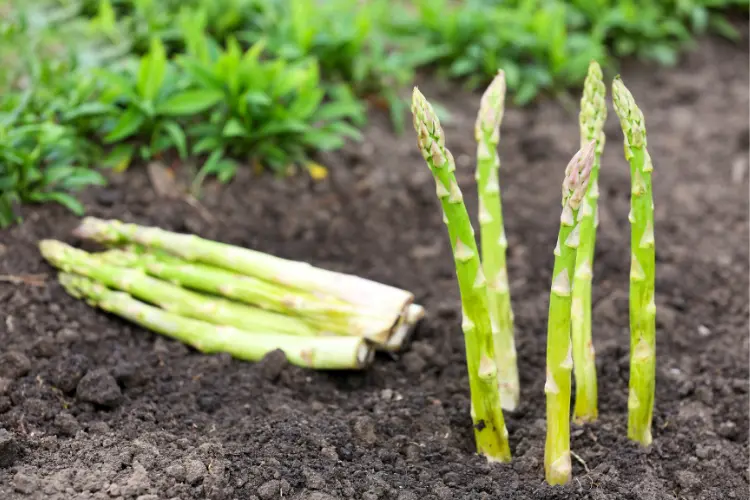
Although it can be rewarding to feed your chickens asparagus, it’s crucial to be mindful of potential risks and take appropriate precautions.
Seasonings, as mentioned before, are out of the question when preparing asparagus for your flock. It’s also essential to maintain cleanliness in the coop by removing any uneaten or rotten asparagus pieces promptly.
This simple step can help you avoid attracting pests that might harm your chickens’ health and living environment.
Being vigilant and informed about what you feed your chickens is key. Ensuring that asparagus is served unseasoned and in safe portions will help you avoid any possible risks associated with this otherwise healthy treat.
It’s all about balance and care, allowing your chickens to benefit from asparagus without any downsides.
Avoiding Asparagus Berries
One aspect of the asparagus plant, including the purple asparagus variety, that you must be cautious of is the red berries it produces. These berries are toxic and should not be fed to your chickens under any circumstances.
Consuming asparagus berries can lead to vomiting, diarrhea, and other toxic effects, which can be harmful to your chickens’ sensitive digestive systems.
Instead of risking your chickens’ health with asparagus berries, there are plenty of safe and nutritious treats you can offer them. Stick to the spears and always double-check that no berries are mixed in with the parts you’re feeding to your flock.
This will ensure that your chickens enjoy asparagus safely and stay in good health.
Monitoring Baby Chicks
Special care is needed when managing the diet of baby chicks. Their developing digestive systems can only handle foods that are easy to digest, and asparagus is no exception.
If you have baby chicks in your flock, it’s crucial to cook and chop the asparagus into suitable sizes before serving. This ensures that the asparagus is soft enough for the chicks to eat and digest without any issues.
Cooked asparagus is an excellent option for baby chicks, providing them with the same nutritional benefits while being gentle on their delicate systems.
By monitoring what your baby chicks consume, including eating asparagus, and preparing their treats appropriately, you can help them grow into healthy, egg-laying chickens that enjoy a variety of tasty and nutritious snacks.
Alternatives to Asparagus for Chicken Treats
Even though chickens enjoy asparagus, it’s beneficial to diversify their treats. If you’re looking for alternatives that are just as nutritious and delicious, consider veggies like:
- lettuce, which chickens eat lettuce as a healthy option
- beets
- broccoli
- carrots
- cucumbers
In fact, chickens eat cucumber as a tasty and hydrating snack, making it a great addition to their diet.
These can be great options for keeping your chickens happy and healthy, providing them with a broad spectrum of vitamins and minerals.
When selecting treats for your flock, prioritize options that are both safe and beneficial. A diverse diet not only keeps your chickens interested in their food but also ensures they’re getting all the nutrients they need.
So, while asparagus is a fantastic treat, don’t hesitate to explore other vegetable options that your chickens can enjoy safely. Some other safe and beneficial treats for chickens include:
- Leafy greens like spinach and kale
- Fruits like watermelon and berries
- Grains like oats and barley
- Mealworms and other insects
By offering a variety of treats, you can keep your chickens happy and healthy.
Some Vegetables Chickens Can Enjoy
A wide variety of vegetables can help diversify your chickens’ diet. Safe veggies for chickens include:
- Kale
- Swiss chard
- Squash
- Pumpkins
These vegetables, including the fact that chickens eat carrots, are not only tasty but also packed with vitamin c and other vitamins and minerals that support the health of your chickens.
Herbs are another great addition to your chickens’ diet. Some suitable herbs include:
- Lavender
- Mint
- Oregano
- Parsley
- Cilantro
- Thyme
- Basil
These herbs can offer health benefits, such as aiding in digestion and acting as natural pest repellents.
Pumpkins, in particular, are a fun treat for chickens. Not only are they nutritious, but the act of pecking at a pumpkin can provide entertainment and stimulation for your birds.
Treats to Avoid
Unfortunately, not all treats are suitable, and some can pose serious dangers to your chickens. Certain foods should be avoided to keep your feathered friends safe and sound. Among the no-nos are avocados, whose pits and skins contain persin, a toxin that’s harmful to chickens.
Even though the flesh is safe, it’s best to steer clear of avocados entirely to avoid any risk. Likewise, raw potatoes and green potatoes, along with their peels, contain solanine and chaconine, which are toxic and can upset your chickens’ digestive system.
Other foods to keep off the chicken treat list include:
- Rhubarb leaves, which contain oxalic acid that can lead to kidney failure
- Apple seeds, which harbor amygdalin that can release cyanide in the digestive tract when consumed in high amounts
- Chocolate and candy, coffee and tea, onions and garlic, dried rice or beans, undercooked beans, and salty foods, which pose various health risks ranging from digestive disturbances to fatal toxicity
Always be cautious when feeding treats and ensure they’re not only enjoyable but also safe for your chickens.
Read also: Can Chickens Eat Romaine Lettuce? Exploring Risks and Rewards for Your Flock
Final Thoughts
Asparagus can be a healthy and nutritious treat for chickens when fed properly. It’s packed with beneficial nutrients that can support their immune system, contribute to high-quality egg production, and offer a tasty change of pace in their diet.
However, it’s crucial to feed asparagus in moderation, avoid the toxic berries, and ensure it’s properly prepared to prevent choking hazards and digestive issues.
Remember to maintain a balanced diet for your chickens, incorporating a variety of vegetables and treats while steering clear of those that are harmful. By following these guidelines, you can enjoy watching your chickens thrive and produce delicious eggs for your table.

